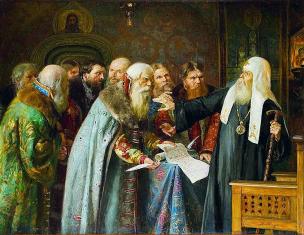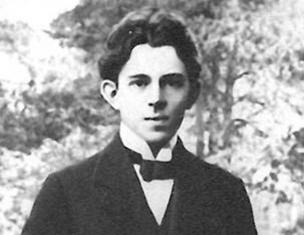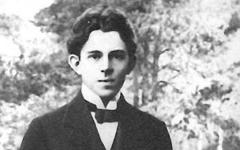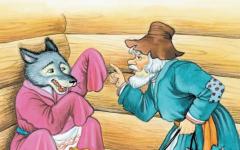On this page read the text “The Tale of a Lazy Man” by Samuil Marshak, written in 1922.
In one action
CHARACTERS
Father.
Fisherman.
Lazy son.
Watchman
Woodcutter.
Old man.
Stonemason.
A pillar with the inscription "Big Road".
FATHER (leading his son out onto the road). Here big road. Go wherever you want. It’s enough for you to sit on the stove and eat your father’s bread for nothing.
LAZY. Your truth, father! But where should I go? I’d rather sit here on a pebble.
FATHER. Why are you going to sit in vain? Get busy.
LAZY. And I, father, will sit and think about what business to do.
FATHER. You've been sitting there for twenty years and haven't come up with anything. Well, okay, sit for another hour and think. And then I’ll come and have a look. If you don't think of anything, I'll drown you!
LAZY. Okay, drown! Your will! (Bows at his feet.)
Father leaves.
Got it! I'll count the ravens! One, two, three... Look how many of them came! Four, five... Look, they scatter, they don’t sit still, it’s hard to count... Six, seven, eight... Eh, I was mistaken, there was an eighth jackdaw! (Waves his hand.) Shh, let's go away! Nine, ten...
The Woodcutter is coming.
WOODCUTTER. Hello, Lazy Guy. What are you doing?
LAZY. I'm counting raven.
WOODCUTTER. Good job, but how much do you get paid for this?
LAZY. They don't pay anything!
WOODCUTTER. This means that this is not a profitable business. You better come to my service.
LAZY. What are you doing?
WOODCUTTER. I chop wood.
LAZY. How do you chop them?
WOODCUTTER. And so! (Shows.)
LAZY. No, I don't like your work.
WOODCUTTER. Why is she bad?
LAZY. You have to work standing. Your legs will get tired.
WOODCUTTER. Well, look for easier things to do! (Leaves.)
The Stonecutter appears.
STONEMAN. Hello, Lazy Guy. What are you doing?
LAZY. I'm looking for work.
STONEMAN. What can you do?
LAZY. Counting crows, chopping wood.
STONEMAN. Why don't you do this?
LAZY. Counting crows is not profitable, chopping wood requires standing, your legs will get tired.
STONEMAN. Come to my service. I work while sitting.
LAZY. How do you work?
The stonecutter sits down and begins to hammer on the stone.
No, this job is not good for me. Your back will hurt.
STONEMAN. Well, look for an easier job. (Leaves.)
The Fisherman appears.
FISHERMAN. Hello, Lazy Guy. What are you doing?
LAZY. I'm looking for work.
FISHERMAN. What can you do?
LAZY. Counting crows, chopping wood, cutting stones.
FISHERMAN. Why don't you do this?
LAZY. Counting crows is not profitable, chopping wood requires standing, your legs will get tired, cutting stones will hurt your back!
FISHERMAN. Well, come to my service. My job is easy: cast a fishing rod and wait for it to bite.
LAZY. This is good work. How long do you have to wait?
FISHERMAN. Sometimes you'll sit there all day.
LAZY. No, I don't like your work. I like to sleep during the day.
FISHERMAN. If you don't like it, don't do it. Look for an easier job! (Leaves.)
The Watchman appears with a mallet.
WATCHMAN Hello, Lazy! What are you doing?
LAZY. I'm looking for work.
WATCHMAN What can you do?
Lazy. Count crows, chop wood, cut stones, catch fish.
WATCHMAN Why don't you do this?
Lazy. Counting crows is unprofitable, chopping wood requires standing, your legs will get tired, cutting stones will hurt your back, catching fish means you can’t sleep during the day!
WATCHMAN Come to my service. I sleep all day.
LAZY. All day? This is good. When do you work?
WATCHMAN At night. I go and watch.
LAZY. No, your job doesn’t suit me, I even like to sleep at night!
WATCHMAN Oh you, Lazy! Look for another owner! (Leaves.)
Father appears.
FATHER. Well, Lazy Guy, have you come up with something to do?
LAZY. I came up with it, father, I came up with it!
FATHER. What can you do?
LAZY. Count crows, chop wood, cut stones, catch fish, guard people.
FATHER. Why don't you do this?
LAZY. Counting crows, father, is unprofitable, chopping wood - you have to stand, your legs will get tired, cutting stones - your back will hurt, catching fish - you can’t sleep during the day, guarding people - you can’t sleep at night!
FATHER. Oh you, Lazy, Lazy! You won't do any good! Let's go, I'll drown you in the river!
LAZY. How far is it to go?
FATHER. No, not far. You and I passed through the river when we came here.
LAZY. You would have drowned earlier, otherwise now you have to go back!
FATHER. Bend over, I'll tie a stone to your neck! (Ties a large stone.)
LAZY. Oh, what a hassle you are!
The Old Man appears.
OLD MAN. Wait, why are you tying a stone around his neck?
FATHER. I want to drown.
OLD MAN. Why drown?
FATHER. He doesn’t want to work, but there’s nothing to feed him.
OLD MAN. I feel sorry for the young man. Give him to me, I'll feed him!
LAZY. What will you feed?
OLD MAN. Here's a bag of crackers. You will soak them in water and eat them.
LAZY. Still wet!
OLD MAN (to father). Well, fellow countryman, I have lived a century in the world, but I have never seen such a lazy person. Drown him, quickly!
FATHER (I'm lazy). Get up, let's go.
LAZY. Where?
FATHER. Yes to the river!
LAZY. I won't go on foot. If you want to drown, take me or carry me in your arms!
FATHER. How can I carry you? I can't lift you!
LAZY. Call people for help!
FATHER. Oh, you're in trouble! (Looking around.) Hey, good people! Help drown the lazy son in the river.
WOODCUTTER
STONEMAN (appearing). Why not help!
FISHERMAN Let's help! Tea, neighbors!
WATCHMAN
(They raise Lazy Man and sing.)
We are taking Lazy Guy to the river!
He lived his life on the stove!
He kept asking me to eat and drink!
We are going to drown him!
LAZY. Well, carry it, carry it, but don’t shake it painfully! At least I’ll ride you one last time... Farewell, good people, don’t remember it badly!
FATHER. You should, Lazy One, take off your hat when saying goodbye to people!
LAZY. Here's another thing - I'm going to take off my hat! And it will be fine! Goodbye, good people!
Everyone leaves, except for the Old Man.
OLD MAN (alone). Ay-ay-ay, I feel sorry for the guy! They'll drown him. This is what laziness can lead to!
The lazy man is back.
LAZY. Corrected!
OLD MAN. Oh, my dear! Has he really improved? Well, sit down, take the stone off your neck! Is it hard for you?
LAZY. How hard it is! (Tries to remove the stone.) Let it hang! One more time to untie the rope... It’s okay, I’ll get used to it!
OLD MAN. What are you going to do now, my dear?
LAZY. I will work.
OLD MAN. What a great guy! What kind of work will you take on?
LAZY. I'll count the ravens!
OLD MAN. What's the use of this?
LAZY. No use, but not much hassle! Sit on a rock and count... Look how many of them have come! One, two, three, four... Ksh! (Waves his hat.)
Note:
The play “The Tale of a Lazy Man” was first published with the subtitle “In Act 1” in the book: “Vasilyeva E. and Marshak S., Theater for Children,” 1922.
15.02.2016
When winter came, the hedgehog Bull was very happy about the snow. He sledded down a high hill, played snowballs with Little Bear and ate juicy tangerines. And in the evening, my mother told the hedgehog, tired from the day’s games, interesting stories. She remembered many of them by heart, and found some on the Internet. She also found a fairy tale about laziness there, which helped the hedgehog a lot.
How they told Buly a fairy tale about laziness
One morning Buhl woke up and saw that all the paths to their cozy house were so covered with snow that it was impossible to go outside. Because of this, the school was closed for quarantine, and the hedgehog had to stay at home all alone. 
Buhl woke up when his parents had already left for work. A delicious breakfast was waiting for him on the table. After eating, the hedgehog began to think about what to do. Of course, it was necessary to wash the plate, but the hedgehog did not want to get its paws wet. He took out his toys, but it was boring to play alone. Buhl threw his cars on the floor. He wandered around the house and then fell asleep.
The hedgehog slept all day and all night. And when his mother woke him up in the morning, Buhl suddenly became too lazy to get up. He didn't want to get dressed, brush his teeth, or make his bed. The Hedgehog didn’t even want to go to visit the Little Bear. But he was his best friend!
Buhl, are you feeling unwell? - Dad asked him in the evening.
The hedgehog admitted that he did not have a fever, but for some reason he did not want to do anything. Then dad told him:
- Let's read a fairy tale about laziness.
Dad tells a story
“A long time ago, when our forest was very small, a little girl came into it. She was wearing a dress with jam stains, and one of her pigtails was disheveled. The girl sat down on a tree stump and sat on it all day. A little squirrel ran up to her and invited her to play with him. But the girl refused. She didn’t go with the bunny, and she also refused the bear cub. Her long sighs echoed through the forest and disturbed its inhabitants. Children didn't want to play to these sounds, and their mothers didn't want to bake delicious pies. Dads didn't go to work. All the inhabitants of the forest did nothing. Very soon their houses became dirty and their refrigerators empty. The forest dwellers became sad.” 
- Buhl, this girl's name was Lenya. She comes when you say you're bored.
- How did they drive her away, dad?
Papa the hedgehog smiled:
“They didn’t drive her away.” Mother Bunny saw that everyone was sad and lazy. And she decided to bake her signature cherry pie. And he smelled so delicious that the girl fell in love with his scent. She was promised a piece if she combed her hair and washed her dress. The girl initially refused, but Bunny’s mother put a scoop of ice cream on the pie. The girl could not resist and tidied herself up.
When she came into the kitchen, clean and beautiful, there was a smile on her face. The girl didn't want to be sad anymore. She ate the pie and even washed her plate. 
- So it's all about the cherry pie? - asked the hedgehog.
- No, Buhl. When laziness comes, you should not give in to it. I need to brush my teeth and help my mom. You know, hedgehogs and others forest dwellers are only happy when they do something. That's why dads go to work, children go to school, and moms bake pies.
Buhl understood everything, and he felt very ashamed. He decided to download a fairy tale about laziness and read it to all his school friends.
The next morning he woke up very early, made the crib, cleaned the needles and made tea for mom and dad. And then he ran to Little Bear and was never lazy again!
We have created more than 300 cat-free casseroles on the Dobranich website. Pragnemo perevoriti zvichaine vladannya spati u native ritual, spovveneni turboti ta tepla.Would you like to support our project? Let's go out, s with new strength Continue writing for you!
In one action
CHARACTERS
Lazy son.
Woodcutter.
Stonemason.
A pillar with the inscription “Big Road”.
FATHER (leading his son out onto the road). Here's the big road. Go wherever you want. It’s enough for you to sit on the stove and eat your father’s bread for nothing.
LAZY. Your truth, father! But where should I go? I’d rather sit here on a pebble.
FATHER. Why are you going to sit in vain? Get busy.
LAZY. And I, father, will sit and think about what business to do.
FATHER. You've been sitting there for twenty years and haven't come up with anything. Well, okay, sit for another hour and think. And then I’ll come and have a look. If you don't think of anything, I'll drown you!
LAZY. Okay, drown! Your will! (Bows at his feet.)
Father leaves.
Got it! I'll count the ravens! One, two, three... Look how many of them came! Four, five... Look, they scatter, they don’t sit still, it’s hard to count... Six, seven, eight... Eh, I was mistaken, there was an eighth jackdaw! (Waves his hand.) Shh, let's go away! Nine, ten...
The Woodcutter is coming.
WOODCUTTER. Hello, Lazy Guy. What are you doing?
LAZY. I'm counting raven.
WOODCUTTER. good
The point is, how much do you get paid for this?
LAZY. They don't pay anything!
WOODCUTTER. This means that this is not a profitable business. You better come to my service.
LAZY. What are you doing?
WOODCUTTER. I chop wood.
LAZY. How do you chop them?
WOODCUTTER. And so! (Shows.)
LAZY. No, I don't like your work.
WOODCUTTER. Why is she bad?
LAZY. You have to work standing. Your legs will get tired.
WOODCUTTER. Well, look for easier things to do! (Leaves.)
The Stonecutter appears.
STONEMAN. Hello, Lazy Guy. What are you doing?
LAZY. I'm looking for work.
STONEMAN. What can you do?
STONEMAN. Why don't you do this?
STONEMAN. Come to my service. I work while sitting.
LAZY. How do you work?
The stonecutter sits down and begins to hammer on the stone.
No, this job is not good for me. Your back will hurt.
STONEMAN. Well, look for an easier job. (Leaves.)
The Fisherman appears.
FISHERMAN. Hello, Lazy Guy. What are you doing?
LAZY. I'm looking for work.
FISHERMAN. What can you do?
FISHERMAN. Why don't you do this?
FISHERMAN. Well, come to my service. My job is easy: cast a fishing rod and wait for it to bite.
LAZY. This is good work. How long do you have to wait?
FISHERMAN. Sometimes you'll sit there all day.
LAZY. No, I don't like your work. I like to sleep during the day.
FISHERMAN. If you don't like it, don't do it. Look for an easier job! (Leaves.)
The Watchman appears with a mallet.
WATCHMAN Hello, Lazy! What are you doing?
LAZY. I'm looking for work.
WATCHMAN What can you do?
WATCHMAN Why don't you do this?
WATCHMAN Come to my service. I sleep all day.
LAZY. All day? This is good. When do you work?
WATCHMAN At night. I go and watch.
LAZY. No, your job doesn’t suit me, I even like to sleep at night!
WATCHMAN Oh you, Lazy! Look for another owner! (Leaves.)
Father appears.
FATHER. Well, Lazy Guy, have you come up with something to do?
LAZY. I came up with it, father, I came up with it!
FATHER. What can you do?
FATHER. Why don't you do this?
FATHER. Oh you, Lazy, Lazy! You won't do any good! Let's go, I'll drown you in the river!
LAZY. How far is it to go?
FATHER. No, not far. You and I passed through the river when we came here.
LAZY. You would have drowned earlier, otherwise now you have to go back!
FATHER. Bend over, I'll tie a stone to your neck! (Ties a large stone.)
LAZY. Oh, what a hassle you are!
The Old Man appears.
OLD MAN. Wait, why are you tying a stone around his neck?
FATHER. I want to drown.
OLD MAN. Why drown?
FATHER. He doesn’t want to work, but there’s nothing to feed him.
OLD MAN. I feel sorry for the young man. Give him to me, I will feed him!
LAZY. What will you feed?
OLD MAN. Here's a bag of crackers. You will soak them in water and eat them.
LAZY. Still wet!
OLD MAN (to father). Well, fellow countryman, I have lived a century in the world, but I have never seen such a lazy person. Drown him, quickly!
FATHER (I'm lazy). Get up, let's go.
LAZY. Where?
FATHER. Yes to the river!
LAZY. I won't go on foot. If you want to drown, take me or carry me in your arms!
FATHER. How can I carry you? I can't lift you!
LAZY. Call people for help!
FATHER. Oh, you're in trouble! (Looking around.) Hey, good people! Help drown the lazy son in the river.
WOODCUTTER
STONEMAN (appearing). Why not help!
FISHERMAN Let's help! Tea, neighbors!
(They raise Lazy Man and sing.)
We are taking Lazy Guy to the river!
He lived his life on the stove!
He kept asking me to eat and drink!
We are going to drown him!
LAZY. Well, carry it, carry it, but don’t shake it painfully! At least I’ll ride you one last time... Farewell, good people, don’t remember it badly!
FATHER. You should, Lazy One, take off your hat when saying goodbye to people!
LAZY. Here's another thing - I'm going to take off my hat! And it will be fine! Goodbye, good people!
Everyone leaves, except for the Old Man.
OLD MAN (alone). Ay-ay-ay, I feel sorry for the guy! They'll drown him. This is what laziness can lead to!
The lazy man is back.
LAZY. Corrected!
OLD MAN. Oh, my dear! Has he really improved? Well, sit down, take the stone off your neck! Is it hard for you?
LAZY. How hard it is! (Tries to remove the stone.) Let it hang! One more time to untie the rope... It’s okay, I’ll get used to it!
OLD MAN. What are you going to do now, my dear?
LAZY. I will work.
OLD MAN. What a great guy! What kind of work will you take on?
OLD MAN. What's the use of this?
LAZY. No use, but not much hassle! Sit on a rock and count... Look how many of them have come! One, two, three, four... Ksh! (Waves his hat.)
Curtain…
The Tale of a Lazy Man (play)
You might also be interested in the following tales:.
In the literature of various countries, there are traditionally many fairy tales (folk and literary) about good and evil, strong and vile, brave and stupid... Among them are fairy tales about lazy people. This is probably no coincidence, because laziness is one of the most “glorified” properties of human nature, along with courage, dexterity, and cunning. Moreover, some fairy tales about lazy people admire this quality quite literally. And in some, characters who don’t like to work are simply popular.
Russian fairy tales about lazy people. Titles and characters
Among Russian folk creations, a striking example is “At the command of the pike.” Emelya, main character fairy tales, for sure, are the very personification of this human property. Folk work tells about a man who does not want to work, lying on a Russian stove all day long (some researchers folk art consider the stove as a symbol of mother laziness). What happens next? Emelya accidentally catches a pike, which for its release offers the main character the fulfillment of all his desires “at the behest of the pike.” The buckets go home without spilling any water. The sleigh moves on its own. And then, on a Russian stove, Emelya comes to the Tsar himself, where, with the help of pike magic, he makes Princess Marya fall in love with him. The indignant king orders the young ones to be rolled into a barrel. But here too, luck is on Emelya’s side. “At the behest of the pike,” everything will turn out just fine again: Emelya is not only miraculously saved together with the princess, but also becomes rich and handsome (and the king himself already recognizes and fears him).
"Lazy Wife"
But Russian fairy tales about lazy people not only glorify this quality of human character. In some of them, for example, “The Lazy Wife,” laziness is condemned, and a person who acts in this way is subject to reproach and punishment. This work tells the story of a wife who did not work around the house or weave like other women (as was customary). The lazy wife constantly shirked her duties and made excuses. Then the husband decided to teach his negligent wife a lesson and pretended to die. But there’s nothing to bury my husband in! After all, the lazy wife didn’t weave anything. First she wraps her husband with threads, then with blankets brought by others. And then he suddenly “resurrects.” The wife is frightened, punished and now weaves fabric, like all obedient women.

Literary tales
Not only in Russian folklore, fairy tales about lazy people (everyone knows their names: “12 months”, “Morozko”, “Two Frosts”) were extremely popular. For example, the great Russian poet A. S. Pushkin introduced great contribution in this literary genre. The poetic tale “About the Priest and His Worker Balda” can rightfully be considered one of best works on this topic. By the way, it will be interesting to know what is the basis literary work, written by Pushkin, formed the basis of the folklore “The Laborer Shabarsha” (published and recorded by the fairy tale collector Afanasyev). The poet's poems contrast the hard-working Balda and the lazy owner - the priest. The farmhand fulfills all the whims of the cult minister in exchange for food and payment at the end: three clicks on the forehead. Balda is skillful, brave, strong, the kind that can overcome even devils. Pop is cunning, lazy, greedy. But retribution is not far off for him. The bulldozer demands the agreed payment, and the lazy owner has to expose his forehead to the clicks, which he cannot withstand and dies.

Titles of famous fairy tales about lazy people
Many nations have such works - literary and folklore. These include the Japanese work “Fan Tengu”, the French “Puss in Boots” (literally retold by Charles Perrault), Grimm’s “Lazy Heinz”, Indian fairy tale“About the Lazy Cuckoo”, Bashkir “About the Lazy Girl” and many others. We can say about all these works that these are fairy tales about lazy people.
So, they say, the favorite heroes of Russian fairy tales (Ivan the Fool, Balda, Emelya) are lazy and fools. And in general, it’s customary for us to somehow look at our folk tales somewhat downwardly, they say - some kind of nonsense, stupid fairy tales, sheer nonsense.
But thinking like that is a big mistake. First of all, because this is how Russian folk tales are seen only from our adult point of view.
But if you look at these heroes eyes not adults, but children– then these fairy tales are not at all about lazy people and fools, but ABOUT THEM THEMSELVES!!!
Want proof? Observe your children's reaction to these stories.
Do you want to know what feel CHILDREN, when do they listen to fairy tales about Emelya, Balda and Ivan the Fool?
1. Firstly, that the main characters of these fairy tales are very close to them
- precisely because they are also completely unaware of the adult world of endless “useful and necessary” things to do. They don't fit into it. So are they - for now.
2. Secondly, that heroes (adults!) also make mistakes
And sometimes they are so stupid and ridiculous that even small children can understand that they made a mistake and got into trouble. They chose a bag of sand rather than silver as payment for labor (“Balda”), went for firewood and, unable to cope with the sleigh, ran over a bunch of people (“Emelya”), released a beautiful mare in exchange for a small humpbacked horse (“Humpbacked Horse” ).
(By the way, psychologists say that young children are VERY afraid of making a mistake - especially in comparison with an adult who can do everything a hundred times better and never makes a mistake in children’s eyes. Why not “smart older brothers” from all fairy tales?)

3. Well, and the fact that they are all either slackers or slackers who are not striving for anything - so this is again about children!
They don’t understand why they need to go chop wood if the stoves don’t work so well. Why do you need to endlessly carry water, guard horses, work here, there...
They don’t yet have a “program” to do something because they “have to” - they only do what they want and what brings them pleasure. They live by their simple desires.
And these fairy tales are important to them a hundredfold. They have enormous psychotherapeutic potential.
Because it is these fairy tales that calm the anxieties that arise in children.
They say:
- Look, there he is, such a big guy, quite an adult - and he’s also making mistakes! It’s okay to make mistakes, don’t be afraid of mistakes!
- The road to true love is always difficult - but don’t be afraid of difficulties, boldly overcome trials, like Ivan Tsarevich, and you will find your happiness (this is for boys, of course; fairy tales encourage girls to follow the example of Elena the Beautiful and other princess girls);
- Don’t be afraid to trust your intuition, follow it, like Ivanushka follows the ball, and the girl Vasilisa follows the advice of the doll;
- Follow your feelings, even when your mind says otherwise. Look: you thought that taking a bag of sand was stupid, that Balda lost - and he used it to save a beauty from the fire. It turns out – I won!
- Like Emelya, you also don’t like it when elders ask you to do something that you “reluctantly” - but, firstly, Emelya does it anyway (which means you need to help your elders, even when you don’t seem to want to). And secondly, when we respond to the suggestions and requests of other people, miracles can happen to us (magic ring, pike, snake).
— Being kind, honest, sincere, open (asking everyone for directions, helping everyone) is good. The world helps those who help it. Repays good with good.
— There are scoundrels in the world (deceiving brothers, thieving Foxes, everything-destroying Snakes Gorynych, greedy evil Koshchei). But they are exceptions, specific characters. The world as a whole (rivers, trees, animals, the Sun and the Moon, the wind...) is kind, sympathetic, loving and fair. And he will always help you defeat any evil. The main thing is that you yourself remain kind.
4. And children do not measure the actions of heroes with “adult justice.”
They are not yet familiar with either the Bible or the Constitution. These things are still too complicated for them. But they are very consonant with the feelings of the heroes.
And when Emelya ran over a bunch of people with his sleigh, they feel that he didn’t want this, that he accidentally did it. “Just like yesterday I accidentally pushed Stasik.”
And the fact that in the forest he made a club and way back she “broke off the sides” of the people whom he accidentally offended, and they were going to take revenge on him on purpose, by attacking him alone in a crowd - so this can even cause rejoicing. Because the baby feels that revenge is not fair, and that in this sense Emelya is right. And also because the baby does not yet know how to stand up for himself - and learns from the hero to defend himself from offenders.
(By the way, in the original version of the tale, Emelya made not a mace in the forest, but a stick for carrying firewood, a useful thing for the house. He is a good hero, not at all vindictive. And when he was attacked by offended townspeople, he ordered her to “break off their sides” I think that this version of the tale is more reliable. Well, and moral, of course).
When Emelya goes to the king on the stove, for an adult it sounds like highest degree laziness and arrogance, but for a child - as the highest courage to remain oneself even in such extraordinary and dangerous circumstances.
 When he whispers about Princess Marya: “Let her love me!”, for us this is a sign of impudence and offensive freebies, but for children it is a sign that they do not love her for something, that there is no corruption in her. It has value, but no price. And that you can ask for love just like that. And what’s even more surprising is that you can get it.
When he whispers about Princess Marya: “Let her love me!”, for us this is a sign of impudence and offensive freebies, but for children it is a sign that they do not love her for something, that there is no corruption in her. It has value, but no price. And that you can ask for love just like that. And what’s even more surprising is that you can get it.
The fact that the two of them were then chained in a barrel means that not everyone may like your desires, and that some people can create serious trouble for you for them.
But also the fact that there is a power that hears your requests, and - if you are true to yourself, kind and honest - will always help.
So is there a “freebie” in Russian fairy tales?
Or is this a “virus” invented by those adults who themselves did not hear these fairy tales as children?
And who are the favorite heroes of our fairy tales - fools, lazy people, princes or... our children with you? Kids, for whom, in essence, these fairy tales were written...
So, feel free to read them to your little ones!
And may our children grow up as bright and pure in soul as the Russian heroes folk tales.

P.S. How do your children listen to fairy tales? Do you read Russian folk tales to them? What do your kids say about Balda, Emelya and Ivan the Fool, why do they like them (or not like them)? What heroes do they want to be like, and why? Write in the comments!

You can download the issue and get the password for its articles on the website by clicking on the cover on the left.
Subscribe to articles and videos of the project
and what you like!









